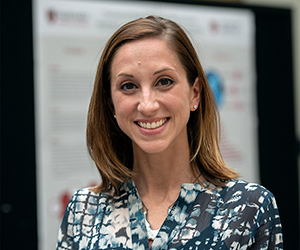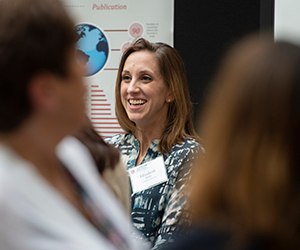
“This is a dirty room. This patient has HIV.” These words, spoken by the head shift nurse, changed Elizabeth Siliski’s life. At the time, Siliski was a hospital operating room assistant and her duties included wiping down surfaces and disposing of trash prior to the next procedure.
But when the nurse threw a papery sterile gown at Siliski, while the patient was still on the operating table awakening from anesthesia, she knew something was wrong.
“This was in 2010. We knew that HIV isn’t a contact precaution. It’s not procedure to gown up to clean an HIV patient’s room.” Siliski said. “At the time, I didn’t know that was incorrect protocol. But I did know that calling a patient dirty wasn’t appropriate, whether they were conscious or not.”
Siliski was in nursing school at the time and the exchange made her feel uncomfortable. She decided that once she became a nurse, one of her goals would be to ensure that both her patients and colleagues were treated respectfully and had a way to navigate difficult situations.

Bedside Bioethics
Siliski spent the last six years at Massachusetts General Hospital (MGH) in Boston working as an intensive care unit (ICU) nurse. The biggest challenges many nurses face are not medical or clinical skills, but helping patients and families through life-changing situations. Now she wants to help nurses feel comfortable in those same situations.
Siliski graduated from Emory University in Atlanta, Georgia, with a bachelor’s degree in neuroscience, then attended law school focusing on intellectual property. After a year, she realized law was not her calling.
“As much as I enjoy writing and research, I couldn’t see myself sitting still at a desk every day. I needed something more active,” she said. “Good thing I ended up as an ICU nurse,” she laughs.
She enrolled in the MGH Institute for Health Professions earning an accelerated second bachelor’s degree in nursing, and later trained as an ICU nurse. “I went from not knowing what vital signs were, to a full-fledged ICU nurse in less than two years,” she said.
Now that she’s a seasoned nurse, Siliski says her top priority, after patient safety, is training new nurses. She stresses the seriousness of ICU care and the importance of nurses’ role, despite often being at the bottom of the hospital pecking order.
“Nurses ensure a sterile environment that eliminates disease spreading to the next patient. It’s big picture thinking that gives nurses and nurses-in-training a sense of purpose and meaning behind the work they are doing every day, even if it’s mopping blood off the floor,” she says.
Big picture thinking is something that Siliski excels at. “From the bedside, I can only help my one patient,” she said. “Getting my master of bioethics degree is a way for me to affect change at a high level, while maintaining a daily clinical practice,” said Siliski.
An Unmet Need
Now, the accomplished ICU nurse prides herself on being an ethics resource on her unit at MGH. “My colleagues, even physicians, come to me for advice and resources because they know I have this amazing degree and experience with the tough topics. It feels great,” she said.
Siliski dreams of someday writing a comprehensive handbook on nursing ethics, stressing how interesting, even fun, ethics is. “Like a Harry Potter series of nursing ethics, where new nurses have to face some really difficult challenges around each corner,” she said.
The purpose behind the book would be to address what Siliski says is the biggest unmet need in all forms of clinical education: ethics training.
“We need ethics simulation training,” Siliski said. “In the same way that clinicians practice CPR on plastic dummies, we need to prepare health science students how to think and act in ethically challenging situations, where neither the patient nor the medical staff is comfortable.”
Siliski’s method of ethics training would be to provide role play that simulates family meetings with medical practitioners in which students can practice talking with patients and their family members to deliver hard news.
“Students should learn how to explain the options of care, and determine goals with each family,” she said. “The first time a doctor has that conversation shouldn’t be with a patient in grief.”
Siliski thinks that more dry runs of tough conversations, especially with physicians, would be particularly helpful.
Ethics Expertise
Nurses have historically played a valuable role in tough conversations with patients—voted the most trusted professionfor sixteen years in a row. Siliski says there’s a reason for that.
“A physician and I were delivering news to a family that our patient had a terminal diagnosis,” she said. “I could tell from their faces that the doctor wasn’t addressing the family’s concerns.”
Siliski cut in. “I told the family, ‘He won’t experience any pain. We will keep him comfortable.’” This simple news, she says, brought relief and changed the whole atmosphere of the meeting.
“I think doctors have to function on a different level. They have to think through the technicalities, the legality of their comments, especially when dealing with end-of-life issues. Nurses can be good translators for laypeople, giving a more personal meaning to the medicine.”
To this end, Siliski coordinates and participates in bimonthly ethics rounds in the ICU, often bringing in experts on a specific case to provide a more targeted ethical analysis. She rounds on adult patients who have undergone serious trauma like gunshot wounds, car accidents, and other critical conditions. She currently sits on the Optimum Care Committee (OCC), which is MGH’s ethics committee, where she facilitates discussions about difficult cases in the hospital.
Another Angle
Siliski’s work on the wards has been informed by her training in the master of bioethics program. She was student editor of the Summer 2018 issue of the Harvard Medical School Bioethics Journal, which combined her interests in writing, leadership, and bioethics communication.
“I have a much better appreciation for what goes into this kind of editorial work,” she said. She particularly enjoyed learning more about bioethical topics that she doesn’t have direct experience with.
One of the articles, Partial Humanity: Ethical considerations in the use of chimeric pigs for human organ transplantation, explained the use CRISPR/Cas9 technologies and the possible unintended consequences of using them. It was these kinds of eye-opening experiences that she most enjoyed at the Center.
Siliski represented the Center at the National Nursing Ethics Conference, where Christine Mitchell, the Center’s executive director, delivered the keynote. Siliski said it was an honor to see her speak to a room full of nurses who share similar interests.
“I felt at home in that environment with other nurses who are interested in ethics. We have the same passion. I think we need more nurse-bioethicists,” Siliski said. ““I have such an intense background and valuable perspective to bring to conversation, I would love to see more people with my background involved in the bioethics master’s program.”
A Leading Priority
Siliski hopes to continue practicing as an ICU nurse while consulting and sitting on an ethics advisory board part-time. “One job informs the other,” she said.
Breaking down silos in medicine, Siliski says, is one of the ways she can address systemic problems that can’t be solved in daily clinical care. “Bringing practicing clinicians into hospital leadership roles is the best way to make ethics a top priority in clinical care,” Siliski said.
“I felt at home at the [National Nursing Ethics Conference] with other nurses who are interested in ethics. We have the same passion. I think we need more nurse-bioethicists,”